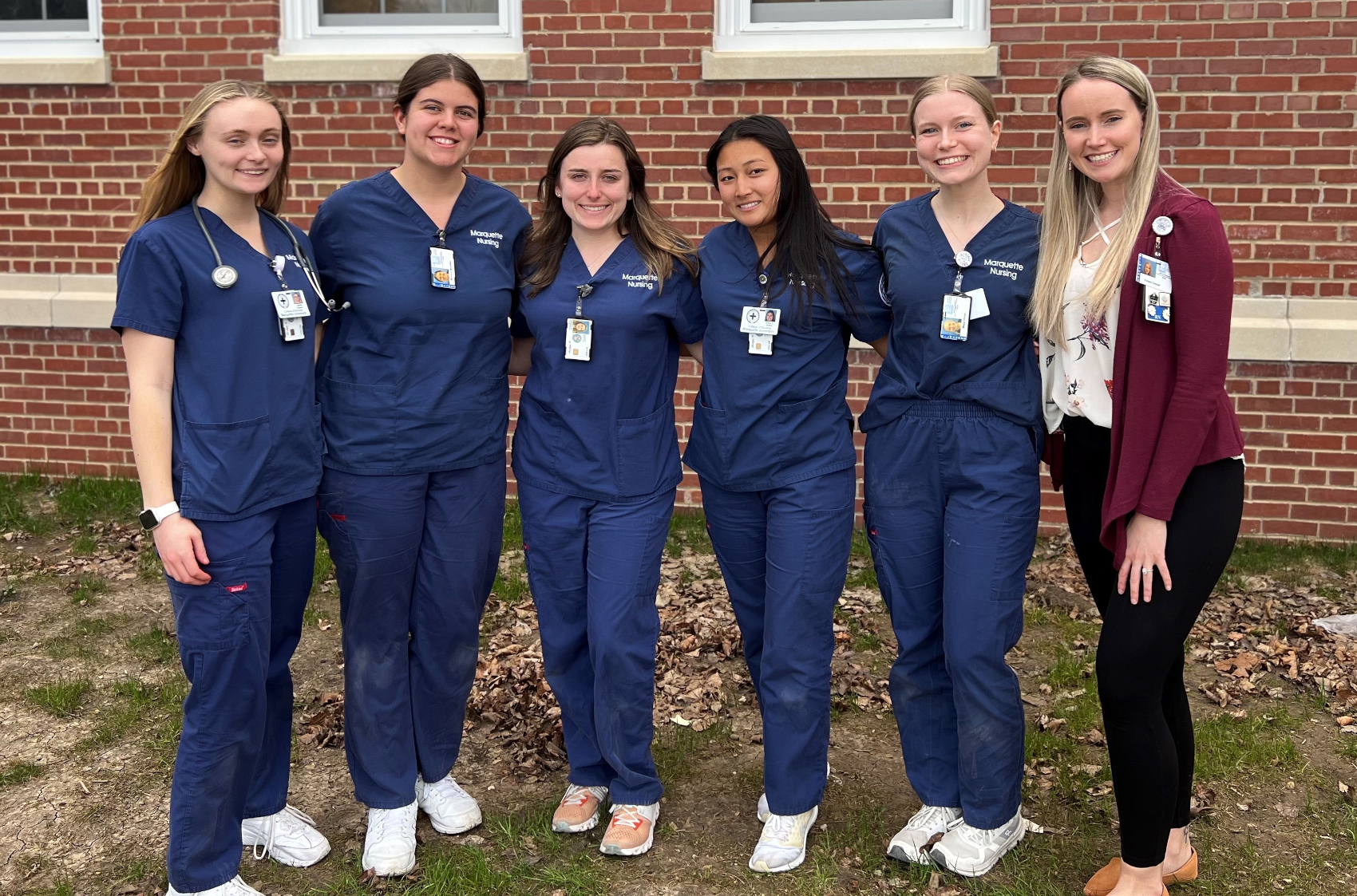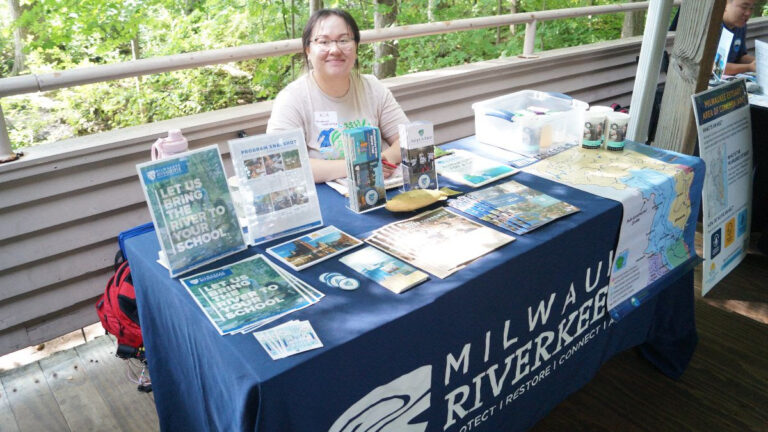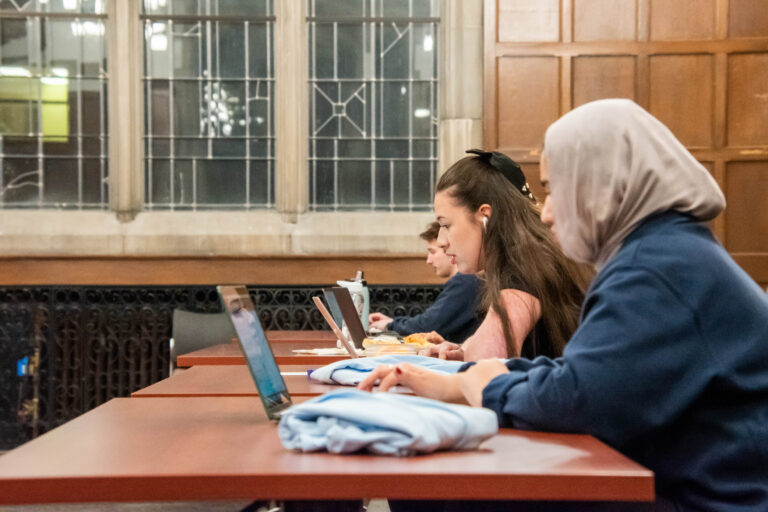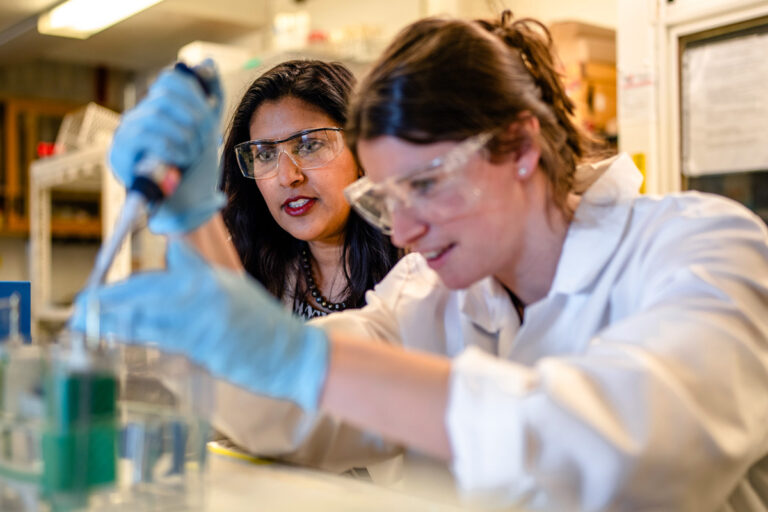Zoe Martin stood outside of her first patient’s room, inhaling and exhaling deeply, taking a moment to collect herself before starting the day’s work.
“It took me 15 minutes to walk into my patient’s room and introduce myself on my first day,” Martin says. “I had to hype myself up.”
Almost two years have gone by since Martin was a nervous junior lingering in the hallway of the Clement J. Zablocki Veterans Affairs Medical Center on Milwaukee’s southwest side. She is now a graduate — not just of Marquette’s College of Nursing, but also of the Veteran Affairs Nursing Academic Partnership (VANAP) cohort. This program offers undergraduate nursing students the opportunity to complete their clinicals at the VA, where they can get hands-on experience caring for military veterans.
Martin was part of a five-student group that stayed with the program during their entire tenure as upper division students. Many of those who enroll in VANAP do so because of a family connection to the armed services.
“My uncle is a Gulf War Army veteran, and he’s one of my favorite people on the planet,” Martin says. “When I heard the nursing school had this program, it become one of the things that swayed me toward choosing Marquette.”
“I also heard about this program when I was in high school because I knew someone who was in it,” says fellow VANAP senior Emily Ethington, whose grandpa served in the Navy during World War II. “I always kept that in mind as a good opportunity.”
All students in the VANAP program are placed in the hospital’s dedicated education unit, where all the registered nurses are certified to work with students. More conventional clinical rotations typically have only a few RNs who have the appropriate certifications. VANAP offers students like Martin an accelerated pace of career development.
“By the third week, I’d given my first shot to a patient,” Martin recalls.
The extra hands-on experience is essential when treating veterans, who often have health care needs not commonly seen in civilians. Ethington handled patient populations with elevated rates of depression and traumatic brain injuries due to combat service. Martin recalls evaluating floors full of Vietnam veterans suffering from diabetes, a side effect of prolonged exposure to the now-banned chemical herbicide Agent Orange.
Establishing trust with veterans can also take more time and patience than with the general population.
“The Vietnam veterans always talked to us about their distrust of the health care system because they weren’t treated the best when they came home from war,” Martin says.
“Sometimes it’s just hard to get patients to trust you at first because you’re learning skills and you’re not quite as experienced as a registered nurse,” Ethington adds.
Both Martin and Ethington started building that trust from scratch, learning how to properly conduct head-to-toe patient evaluations before performing any kind of medical procedure. Under the watchful eye of their preceptors, the nursing students learned to ask the right questions, listen to patient feedback and translate that information into treatment plans.
“You listen to their heart and lungs, check their pulses, ask them about their pain, look at their skin; really just taking a good look at everything from head to toe,” Martin says. “You ask them questions to see how alert they are and how well oriented they are to where they’re at. That’s how you catch conditions early.”
The students moved on to administering injections and even medication once they had mastered the basics.
“We get to do a lot of hands-on things with the nurses because there are just so many diverse cases compared to a regular hospital,” Ethington says.
Being responsible for a wide range of clinical responsibilities prior to graduating college can be an intimidating experience for even the most well-prepared student. Luckily, Ethington and Martin have fellow VANAP participants by their side. Unlike most other clinical programs, VANAP keeps the same group of learners together for their entire time in college, creating a camaraderie that benefits everyone in the program.
“We know each other well enough to be comfortable to ask questions or to point out something we can do better,” Ethington says. “We feel safe in an environment that can feel challenging sometimes. Once the clinical day ended, we still communicated about schoolwork and studying together. I think it was a great relationship we were able to build over these two years.”
“If we had to bathe someone and the full-time nurses were busy, but we didn’t want to do it alone, we could ask each other for help and it wasn’t just someone random,” Martin says.
Their experience in the VANAP program gave Ethington and Martin more than friends; it also clarified their career paths. Ethington will return to the VA for a yearlong nurse residency, with half of that time coming in a mental health rehabilitation clinic. Students who complete VANAP are given hiring priority for this specific residency program, as well as for other positions throughout the VA system.
Martin, on the other hand, will take her VA experience into the surgical ICU at a hospital in her hometown of St. Louis.
“Not every veteran uses the VA hospital. I’m really glad that I’m better prepared to treat any veterans who might come into my unit,” Martin says.
Although they’re going their separate ways after two years, the VANAP seniors are entering the workforce as more experienced and conscientious nurses because of the program.
“It has given me so many opportunities and great experiences. I’m excited to not be nervous going into the adult world after graduation. I think VANAP has helped me feel comfortable in the hospital setting,” Ethington says.
‘Mission of service’ is the latest piece in Marquette Today’s Commencement Series. Read more stories of how our graduates are setting off to Be The Difference beyond campus:
- Following in their fathers’ footsteps
- Ready for liftoff: Marquette senior prepares for role at NASA
- Helping at home: New Marquette Law School grad to help asylum seekers in native south Texas
- Senior co-op with Findorff helps build O’Brien Hall — and leads to full-time job with construction firm
- For one senior, Commencement address will have family ties



